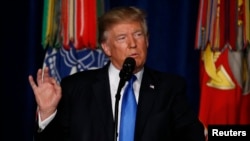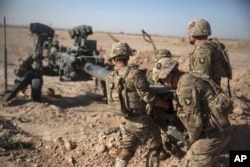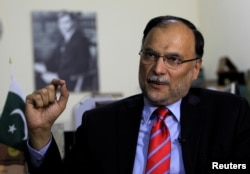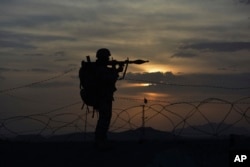When President Donald Trump announced his long-awaited policy on Afghanistan, his remarks Monday hinted the plan was a compromise between his instinct, to “pull out,” and advice he received that “a hasty withdrawal would create a vacuum that terrorists, including IS and al-Qaida, would instantly fill.”
The broad strokes of the policy appeared to be the same as the Obama administration - beat back the Taliban, increase pressure on Pakistan and demand reform from the Afghan government.
Shamila Chaudhary, the team director for Afghanistan and Pakistan for President Barack Obama’s National Security Council from 2010-2011, pointed out her team also had the goal of going after al-Qaida and other terrorist networks using, as Trump said, “all instruments of American power - diplomatic, economic and military.”
Trump’s policy, however, includes changes at the operational level.
The Pentagon, for example, is shifting "from a time-based approach to one based on conditions” as well as an expansion in authority for ground commanders to carry out battlefield decisions without micromanagement from Washington.
No longer will timelines of troop withdrawals, or troop levels, be divulged in advance. Critics of Obama’s strategy said announcing withdrawal dates ahead of time gave the Taliban an incentive to wait it out.
Pakistan criticism
Trump was harsher in his criticism of Pakistan. “We can no longer be silent about Pakistan’s safe havens for terrorist organizations, the Taliban, and other groups that pose a threat to the region and beyond,” he said.
While recognizing Pakistan has been a partner and has suffered from terrorism, he added, “We have been paying Pakistan billions and billions of dollars at the same time they are housing the very terrorists that we are fighting.”
He said that had to change “immediately.”
When asked about Trump's speech, Pakistani Interior Minister Ahsan Iqbal told VOA his country has "neither any tolerance nor an safe haven for any terrorist."
"Pakistan has paid the highest price for [fighting] terrorism," Iqbal said Tuesday. "So, we are fighting terrorism not for any country's sake but for our own future and for our country's sake."
For years, the United States has demanded Pakistan do more against the Afghan Taliban taking shelter on its territory, particularly the Haqqani network. Pakistan has said it is doing all it can, including conducting military operations against “all terrorists.” Behind the scenes, however, Islamabad has said if it cracks down too harshly on the Afghan Taliban, they would join anti-Pakistan militant groups and turn their guns on Pakistan.
“The U.S. could not exclude Pakistan and it could not accept this Pakistani explanation,” said Hasan Askari Rizvi, a political analyst based in Lahore. He added the United States understands a solution to Afghanistan is not possible without Pakistan.
Tools for change
During his speech late Monday, President Trump offered Pakistan a carrot and a stick approach, saying, “Pakistan has much to gain from partnering with our effort in Afghanistan. It has much to lose by continuing to harbor criminals and terrorists.”
Trump also indicated he would increase India’s role in Afghanistan.
Ahmad Majidyar, a senior fellow with the Washington-based Middle East Institute, said Trump mentioned India for two reasons - first, as part of his belief other countries should shoulder more of the burden of international crises and, second, to pressure Pakistan, which has always been wary of Indian influence in Afghanistan.
Islamabad does not want its rival to become so influential in Afghanistan that it confronts Pakistan from the west. Pakistan has often accused the Afghan intelligence agency of working with India to support insurgents in its restive Balochistan province.
But Awais Laghari, a leading member of Pakistan’s ruling party and Cabinet member, says, “If you want to extract something positive (from Pakistan) you can’t do the stick policy. It has not worked so far. We have our own limitations,” he added.
Kamran Bokhari, a senior fellow with the Center for Global Policy and a senior analyst with Geopolitical Future, said the Trump administration could also make it difficult for Pakistan to find money, from international lending institutions like the IMF or the World Bank.
Other policy options could include increased use of drone strikes or Special Forces operations to take out targets on Pakistani soil; but, such past actions have led to a rise in anti-American sentiment in Pakistan. Some analysts say it provides propaganda tools for militant recruiting.
Afghan responsibility
Trump also put Afghanistan on notice, saying it is time for the country to take ownership of its future, remarks former Afghan President Hamid Karzai, who was in power for nearly a decade until 2014, took issue with in a series of tweets.
"I very strongly oppose the new U.S. strategy towards Afghanistan as it is against peace and the national interest of #Afghanistan," Karzai tweeted Tuesday. "The strategy excludes bringing peace and prosperity to Afghanistan and is focused on more war and rivalry in the region. U.S. must seek peace and stability in Afghanistan rather than extending conflict and bloodshed in #Afghanistan and the region."
A statement by U.S. embassy Kabul Special Chargé d’Affaires Ambassador Hugo Llorens clarified U.S. expectations.
“The Afghan government must redouble its reform efforts and deliver on vital promises such as holding parliamentary elections next year and presidential elections in 2019, rooting out corruption, and enacting the tough reforms necessary for meaningful private sector-led economic growth. To maintain stability in the face of insurgent threats, Afghanistan’s leaders must also increase outreach to all ethnic groups and seek greater diversity and inclusivity in the government.”
Infighting between Afghan President Ashraf Ghani and Chief Executive Abdullah Abdullah’s camps since the 2014 elections has delayed meaningful electoral reforms. Meanwhile, rampant corruption has made efforts to govern, control the narco-trade, or even fight the Taliban insurgency harder.
Jawaid Faisal, the deputy spokesman for Abdullah, acknowledged Afghans need to deliver on reform, adding Afghanistan is “committed to becoming a self-reliant state.”
Ghani deputy spokesman Najibullah Azad says the country has undertaken reform. "We have successfully drafted a four-year security plan; top Afghan officials who were accused of corruption have been sentenced."
Trump said the days of America trying to create a society in its image are over, adding, “We will not dictate to the Afghan people how to live, or how to govern their own complex society.”
Majidyar said this gave rise to fears the administration might withdraw support for civil society and reduce emphasis on women’s rights, promotion of democracy, and development of political institutions. “Most Afghans want peace, but not at the cost of all the gains made in 16 years,” he said.







